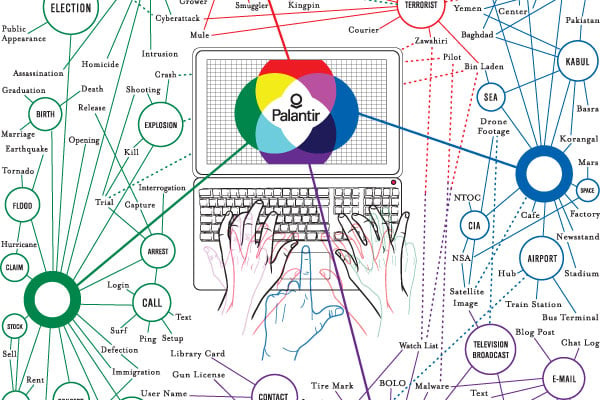Is Palantir the PATRIOT Act 2.0?
They can have my data, I got nothing to hide.
They can have my data; I got nothing to hide.
I can’t tell you how many times I’ve heard that. Although intuitively something about that statement felt wrong, I thought maybe it’s just my paranoid misgivings about privacy and whatnot, until I read a book that put it all in perspective. It’s called Bottoms up and the Devil Laughed: A journey through The Deep State. The whole book is good, and relevant to this story, but one specific line blew my mind, here goes:
Who are you? You are data about data.
You are a web of social relationships.
You are a map of connections.
This morning in the car line at the Montessori school you called a pediatric dermatologist and spoke for two minutes, the time it takes to make an appointment.
From Target, you called a ski instructor and spoke for seventy-two minutes, which is eight minutes longer than yesterday and twenty-three minutes longer than the day before that, which suggests an escalating interest in someone not your spouse.
The ski instructor and you both receive emails from the Montessori school, which suggests that this is how you met.
Both you and the dermatologist receive frequent texts from the Democratic Party.
Both you and your spouse receive emails from the Audubon Society; you used to open these emails, but now only your spouse opens them.
It is intuitive to think that it is the content of our communication that matters, the words of our emails, the turns of phrase with which we text. We want to believe we exist in what we choose to say, but this overstates our autonomy; we are at least as realized in our connections to other people. “A man,” wrote sociologist Charles Cooley in 1901, “may be regarded as the point of intersection of an indefinite number of circles.”
To make themselves real, children invent imaginary friends.
It’s too late, of course; you are already known, though the you that is known is not the you that you are.
Willingly you have surrendered many bits of information that, taken together, form a sclerotic social identity with a strange relation to the real.
Surveillance finds truths, and surveillance serves the creation of elaborate untruths.
In our time we have cast disappearance as suspect —“ghosted,” we say, as if it’s a bad thing—while we celebrate the keeping of a kind of terrible track: I have the receipts.
A paper receipt might get trashed or lost or misfiled, out of reach of digital discovery. But it is our fate to live in the age of the indelible. We all have to have the receipts, receipts for everything, receipts for texts and one-line emails and Facebook messages, an ageless record of the time I made a bad joke in a group thread and my friends twice-tapped haha! so as not to leave me hanging. To study surveillance is to learn, over and over, that we cannot escape ourselves.
At the NSA they have long known that you can make precise predictions simply by knowing the location of people, who they are calling, and for how long. From this “metadata” one builds a picture, makes predictions; one concludes that the Montessori parent will not go on the birding trip with the spouse, but will abscond with the ski instructor.
From this metadata, the intelligence community decides whom to kill.
That last line is, damn, so you see how an entire narrative can be built with your data. And the details can be whatever they like them to be.
Palantir
Palantir was created in 2003, founded by Peter Thiel, originally created to aid the government in the War on Terror, just like the PATRIOT Act.
This section is for businesses but just imagine our information being inserted into this thing.
They have another section called “GOTHAM,” think about that, for fixing crime riddled places like Gotham from Batman.
It has been used for “Pre-Crime Predictions”, consider that, using it to predict whether you were going to commit crimes or not based on your movements.
It will be used to create vaccines that are personalized to you, can’t imagine how that would go wrong.
From the guy who said to Joe Rogan, way before Kash Patel, that he couldn’t see Jeffrey Epstein killing himself, Peter Thiel, and CEO Alex Karp, who I’m sure was a Batman villain in their origin form, this program is going to be a catch-all for all the things our government doesn’t do well, it’s going to handle everything from the IRS to pharmaceutical's, ladies if you're worried about “keeping the government out of your uterus” wait until they’re being injected into your skin.
Just like the PATRIOT Act this will started as counterterrorism and is now being turned towards the people.
Just listen to what the MAGA sycophants have to say about it:
Even better, here’s Laura Loomer on Palantir two years ago
Here she is last week:
More sycophants:
Yes Rabbi, I’m sure.
Palantir is a violation of the fourth amendment of the constitution, which was ratified in 1791.
“The right of the people to be secure in their persons, houses, papers, and effects, against unreasonable searches and seizures, shall not be violated, and no Warrants shall issue, but upon probable cause, supported by Oath or affirmation, and particularly describing the place to be searched, and the persons or things to be seized.”
And the Liberty Clause of the Fourteenth Amendment:
No State shall... deprive any person of life, liberty, or property,
without due process of law.
Later the Supreme Court interpreted this as being our “right to privacy.” Griswold v Connecticut (1965) and Pierce v Society of Sisters (1925).
In 1969, the Court unanimously concluded that the right of privacy protected an individual's right to possess and view pornography (including pornography that might be the basis for a criminal prosecution against its manufacturer or distributor) in his own home. Drawing support for the Court's decision from both the First and Fourth Amendments, Justice Marshall wrote in Stanley v Georgia:
"Whatever may be the justifications for other statutes regulating obscenity, we do not think they reach into the privacy of one's own home. If the First Amendment means anything, it means that a State has no business telling a man, sitting alone in his own house, what books he may read or what films he may watch. Our whole constitutional heritage rebels at the thought of giving government the power to control men's minds."
In a YouTube documentary on the Palantir Vision YouTube channel the very first line of the documentary is:
American company Palantir is providing intelligence to Ukraine to repel the Russian invasion. With the help of artificial intelligence Palantir enables Ukraine to have a better understanding of the battlefield, and gives it the exact location of Russian tanks, planes, and ships, in real time, so that the Ukrainian Army can efficiently tackle the Russian threat on its soil.
That’s what we are unleashing on the American people. This actually is a constitutional crisis. The constitution does not give the government authority to use software like this against their own people! Maybe in Ukraine, but this ain’t Ukraine!
Holy shit, Palantir helped to uncover the world’s biggest Ponzi scheme by Bernie Madoff!
It turns out, the largest Ponzi scheme conviction in history was at least in part the result of Palantir's mysterious data analysis software, according to leaked documents, reported yesterday by TechCrunch. But it wasn't just Bernie Madoff who fell as a result of Palantir's frighteningly powerful tool set.
"It's the combination of every analytical tool you could ever dream of," said Samuel Reading, a former Marine who works as a U.S. military contractor, according to the documents. "You will know every single bad guy in your area."
I wonder how it does with the “bad guys” in the government?
Listen to this, the reporting is more about Palantir than Bernie Madoff:
Since its founding in 2004, Palantir has managed to grow into a billion dollar company while being very surreptitious about what it does exactly. Conjecture abounds. The vague facts dredged up by reporters confirm that Palantir has created a data mining system used extensively by law enforcement agencies and security companies to connect the dots between known criminals.
Here’s more of the reporting from TechCrunch:
In short, the description above is in part correct. But, thanks to this leaked information, we now know far more about the secretive company.
Palantir’s data analysis solution targets three industries: government, the finance sector and legal research. Each of these industries must wrestle with massive sets of data. To do this, Palantir’s toolsets are aimed at massive data caches, allowing litigators and the police to make connections otherwise invisible. For example, a firm hired by the Securities Investment Protection Corporation used Palantir’s software to sort through the mountains of data, over 40 years of records, to convict Ponzi schemer Bernie Madoff (of all things).
Palantir’s software sits on top of existing data sets and provides users with what seems like a revolutionary interface. Users do not have to use SQL queries or employ engineers to write strings in order to search petabytes of data. Instead, natural language is used to query data and results are returned in real-time.
Clients include the Los Angeles Police Department which used Palantir to parse and connect 160 data sets: Everyone from detectives to transit cops to homeland security officials uses Palantir at the LAPD. According to the document, Palantir provides a timeline of events and has helped the massive police department sort its records.
The leaked report quotes Sergeant Peter Jackson of the LAPD stating: “Detectives love the type of information it [Palantir] provides. They can now do things that we could not do before. They can now exactly see great information and the links between events and people. It’s brought great success to LAPD. It supports the cops on the streets and the officers doing the investigations. It is a great tool. They are becoming more efficient and more effective cops. Palantir is allowing them to better serve the public.”
Palantir explains that it is a toolset for use in human analysis on its website. However, we now understand that the service is a smarter way of displaying data for analysis by humans. It is capable of building comprehensive models of activity to detect suspicious anomalies and is even able to provide immunity to fraud thanks to strategies the founders learned while still at PayPal.
Palantir’s anti-fraud system uses algorithms to detect and isolate patterns designated by analysts. This approach was inspired by combating adaptive threats at PayPal, the leaked document states. Four out of the five people on the Palantir management team worked at PayPal. Palantir co-founder Peter Thiel was also a PayPal co-founder.
The document confirms that Palantir is employed by multiple US Government agencies. One of the company’s first contracts was with the Joint IED Defeat Organization in 2006. From 2007-2009 Palantir’s work in Washington expanded from eight pilots to more than 50 programs.
As of 2013, Palantir was used by at least 12 groups within the US Government including the CIA, DHS, NSA, FBI, the CDC, the Marine Corps, the Air Force, Special Operations Command, West Point, the Joint IED-defeat organization and Allies, the Recovery Accountability and Transparency Board and the National Center for Missing and Exploited Children. The Centers for Medicaid and Medicare Services were planning on pilot testing the use of Palantir in 2013 to investigate tips received through a hotline. A second test was run by the same organization to identify potentially fraudulent medical providers in the Southern region of the US.
So, this was already being used by the government, now they are turning it against the people to try and track down who is illegal and who isn’t. This sounds like a bad omen.
Like, in centuries they’ll ask, “America was doing great, they were on a rise and then the country nuked itself, how did that happen?!”
“I don’t know. I can’t imagine what went wrong?”
Listen to this:
To conduct what became known as Operation Fallen Hero, investigators turned to a little-known Silicon Valley software company called Palantir Technologies. Palantir’s expertise is in finding connections among people, places, and events in large repositories of electronic data. Federal agents had amassed a trove of reporting on the drug cartels, their members, their funding mechanisms and smuggling routes. They had dossiers, reports from informants, surveillance images, intercepted electronic communications, footage from drone aircraft. But investigators lacked a way to assemble and share all that intelligence with one another and to quickly find leads buried in mountains of information.
This all sounds very great but, this is the type of software used to triangulate targets in the Drone Wars during the Obama Administration, of which only 8 out of 10 deaths were the actual targets, that’s a real number by the way.
By the way, the reporting above was from 2012 and 2013, why are we just hearing about this now? There’s a reason we weren’t told anything about this software until recently, and I’m sure it's not because they were worried about our privacy.
One last thing, if you’re not convinced your data can be used against you, even if you’re totally innocent, there is a second part to that story from the beginning:
If you remember, according to the data, that lady is having an affair with her ski instructor whom she met at the Montessori school, but it’s the content of our data that actually matters…
Who are you? You are a web of social relationships. You are data about data.
It’s true that you called the ski instructor from Target and spoke for seventy-two minutes, which is eight minutes longer than yesterday and twenty-three minutes longer than the day before that, which suggests an escalating interest in someone other than your spouse.
It is true that you were supposed to go on a birding trip with your spouse, who still opens the emails to the Audubon Society even though you don’t open yours, and that you canceled and let the plane tickets go unused.
But it’s also true, to people who know you, that the ski instructor is your best friend, and has recently slipped back into an old addiction.
It is also true, to people who know you, that the trip was canceled because your child has begun having troubles at school.
You are a web of social relationships. Many, many stories can be spun from that web. “We kill people based on metadata,” a CIA director once said, which is true, and they are often the wrong people.
There must be some way to put the mustard back into the bottle, because this looks like we're staring down the barrel of Minority Report and 1984 crossed into one great Black Mirror episode.
Was Donald Trump where we went wrong or is this the inevitability of a civilization on the rise of technological supremacy? And your choice is buckle up and grab the “Oh shit” bar or fly out the window.
I wish I had the answer.
Thank you for reading!
Editor-in-Chief














